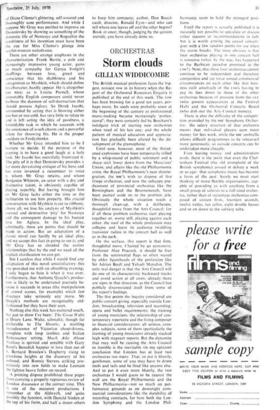ORCHESTRAS
Storm clouds
GILLIAN WIDDICOMBE
The British musical profession faces the big- gest, noisiest row in its history when the Re- port of the Orchestral Resources Enquiry is published at the end of this week. The row has been brewing for a good ten years, per- haps more. Its seeds were probably sown at the beginning of the century as professional music-making became increasingly 'profes- sional'; they were certainly fed by Beecham's indulgent trick of starting new orchestras when tired of his last one; and the whole pattern of musical education and apprecia- tion has gradually been altered by the de- velopment of the gramophone.
Until now, however, most of the threat- ened explosions have been temporarily stilled by a whip-round of public sentiment and a sharp stick lower down from the Musicians' Union, and affairs like the old Philharmonia crisis, the Royal Philharmonic's near disinte- gration, the BBC's wish to dispose of five fringe orchestras, and now the unhappy pre- dicament of provincial orchestras like the Birmingham and the Bournemouth, have been pushed aside on to the problem pile. Obviously the whole situation needs a thorough clean-up, with a deliberate, thoughtful move from the Arts Council; for if all these problem orchestras start playing together or, worse still, playing against each other, the roof of the whole profession may collapse and leave its audience twiddling transistor radios in the concert hall as well as in the park.
On the surface, this report is that firm, thoughtful move. Chaired by an economist, Professor Alan Peacock, it should be free from the sentimental flags so often waved by older figureheads of the profession like Sir Adrian Boult and Yehudi Menuhin. The only real danger is that the Arts Council will do one of its characteristic backward tracks and avoid action at all costs; already there are signs in that direction. as the Council has publicly disassociated itself from some of the report's findings.
The five points the inquiry considered are public-concert giving, especially outside Lon- don; broadcasting, television and recording; opera and ballet requirements; the training of young musicians; the relationship of con- temporary repertoire and the living composer to financial considerations: all serious, com- plex subjects, some of them (particularly the training of young musicians) already stacked high with stagnant reports. But the dynamite that may well be causing the Arts Council to tremble is the inevitable (in my opinion) conclusion that London has at least two orchestras too many. That, to put it bluntly. gentlemen, some of you may have to down tools and tails and be fired like anyone else. And to put it even more bluntly, the two orchestras I would guess to be nearest the wall are the Royal Philharmonic and the New Philharmonia—not so much on per- formance grounds as on downright com- mercial considerations like the durability of recording contracts, for here both the Lon- don Symphony and the London Phil-
harmonic seem to hold the strongest posi- tions.
Until the report is actually published it is naturally not possible to speculate or discuss either reasons or re,:ornmendations in full, but it is worth arming the casual concert- goer with a few random points for use when the storm breaks. The most obvious is that four orchestras playing in one concert hall is nonsense (what, by the way, has happened to the Barbican paradise promised to the LSO?). Next, that these four orchestras cannot continue to be independent and therefore competitive and yet force unreal commercial circumstances on each other like that busi- ness (still unsolved) of the Lso's having to peg its fees down to those of the other orchestras because of pressure from the tar (who govern appearances at the Festival Hall) and the Orchestral Concerts Board (who dish out the Arts Council money).
There is also the difficulty of the competi- tion provided by the BBC Symphony Orches- tra: the salary structure of that orchestra means that individual players earn more money for less work, while the BBC umbrella allows difficult programmes to be rehearsed more generously, so outside concerts can be undertaken more cheaply.
Even leaving money and administration aside, there is the point that even the Chel- tenham Festival (the old stronghold of the British symphony) passed in debate a week or so ago: that symphonic music has become a form of the past. Surely we must start thinking of more flexible organisations. cap- able of providing us with anything from a small group of soloists to a full-sized orches- tra. rather than of stereotype orchestras com- posed of sixteen firsts, fourteen seconds, twelve violas, ten cellos, eight double basses and so on down to the solitary tuba.






























 Previous page
Previous page